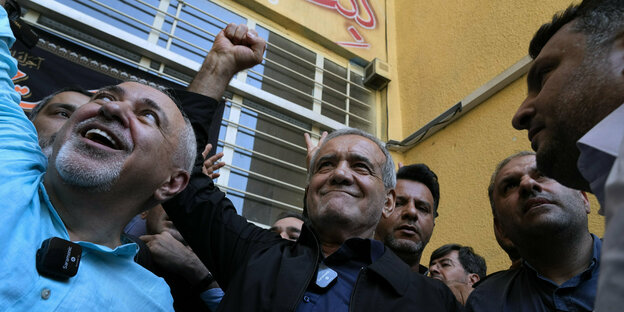The reformist Pezeshkian wins the presidential elections in Iran. The question is, how strong is his urge for reform – and how much influence does he have?
This article first appeared in German in the newspaper die taz: Machtprobe für Irans Wahlsieger
In the Islamic Republic of Iran, there has been a general pattern in elections so far: with high voter turnout, the candidate from the reform-oriented wing wins; with low turnout, the hardliners win. However, the early presidential elections in 2024 broke with this pattern. Despite a low voter turnout of 40 percent in the first and 49 percent in the second round, the lowest figures in the history of the country’s presidential elections, the reform-oriented candidate Masoud Pezeshkian won with 53 percent of the vote.
Pezeshkian, supported by reformist personalities and factions, received over 16 million votes. His main rival, considered a hardliner, garnered 44 percent of the votes, about 12 million. Of the 61 million eligible voters, around 30 million went to the polls, according to official figures, whose accuracy is questioned by regime critics.
Votes of Azerbaijan
Masoud Pezeshkian, whose highest political position so far was the office of Minister of Health, ran for the presidency in 2021 but was disqualified by the so-called Guardian Council, which reviews candidates and oversees elections.
The 70-year-old studied medicine before the Islamic Revolution of 1979 and continued his training in cardiac surgery afterward. From 1994 to 2000, he was President of the Medical University of Tabriz, one of the largest medical universities in Iran. In the second term of President Mohammad Khatami, Iran’s first reform-oriented president and leader of the reform movement, Pezeshkian became Minister of Health in 2001.
Sharp Criticism of Violence Against Protesters
After Mahmoud Ahmadinejad took office in 2005, Pezeshkian withdrew from politics for three years. In 2008, he returned as a member of parliament for the city of Tabriz at a time when many reformists were disqualified by the Guardian Council.
In one of his most famous speeches in parliament, he sharply criticized the violent crackdown on protesters in 2009 following the disputed presidential elections – one of very few MPs to do so. After his speech, there was a minute-long uproar in parliament.
Pezeshkian, who was born in the Kurdish city of Mahabad in western Iran but has Azerbaijani roots, was able to gain some of the Azerbaijani vote by emphasizing his heritage, as they feel disadvantaged due to ethnic discrimination. During his campaign, he spoke in Azerbaijani rather than Persian in Azerbaijani cities.
Also, during the 2022 protests, known as the “Woman, Life, Freedom” movement, Pezeshkian was the only MP who criticized the violence against protesters and called for an investigation into the cause of death of Jina Mahsa Amini, who died in the custody of the so-called morality police. He repeatedly emphasized this issue in his campaign and portrayed himself as a representative of the protest movement.
Ambivalent Stance on Hijab
Pezeshkian repeatedly spoke out against the violent enforcement of the hijab law without questioning the mandatory hijab requirement itself. The opposition reminded of a 2014 interview in which Pezeshkian proudly said that he made hijab mandatory in the hospital where he worked just one month after the 1979 revolution and fired women without hijab.
Another key campaign promise of Pezeshkian was to ease internet restrictions and lift the blockades on social media platforms. “I will make every effort to reform the inefficient blocking system and reintegrate thousands of online businesses employing millions of Iranians into the economic cycle,” he said.
However, the decision on internet censorship does not actually lie with the president but with the so-called Supreme Council of Cyberspace. Most of its members are appointed by Ayatollah Ali Khamenei, the Supreme Leader of the Islamic Republic.
Regarding foreign policy, Pezeshkian has promised to “reduce international tensions and restore active diplomacy and constructive interaction with the world.” Hardliners accuse him of wanting to continue the path of the previous moderate president, Hassan Rouhani. From the perspective of the reform movement, economic improvement is only possible through better relations with Western powers, especially the US and the EU.
Ineffectiveness of Presidential Power
Khamenei, on the other hand, emphasized during the election campaign that the path to economic success does not lead through the US. To what extent foreign policy decisions lie with the president remains questionable.
In his first speech after the victory, Pezeshkian said he had not made any promises he could not keep. Most former presidents see it differently. Apart from President Raisi, who could not complete his term, the last three presidents have complained about the obstacles and excessive interference of the institutions under Khamenei’s oversight and the ineffectiveness of presidential power.
Reform President Mohammad Khatami is quoted as saying that some people wanted the president to be a “servant.” Hardliner Ahmadinejad put this position in the hands of the “smuggler brothers,” referring to the security forces and the Revolutionary Guard under Khamenei, and moderate President Rouhani spoke of a “hidden government.”
The biggest challenge facing Pezeshkian, therefore, is to assert his will despite the resistance of this hidden government.


